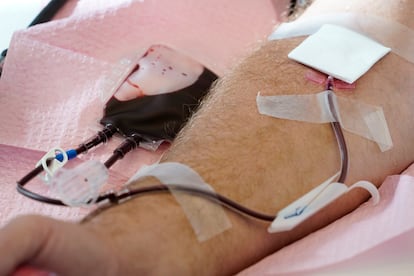FDA eases rules again for gay men seeking to donate blood
The shift would be the latest move by the agency to broaden donor eligibility, with the potential to boost supply

The US is moving to ease restrictions on blood donations from gay and bisexual men and other groups that traditionally face higher risks of HIV.
The Food and Drug Administration (FDA) on Friday announced draft guidelines that would do away with the current three-month abstinence requirement for donations from men who have sex with men. Instead, potential donors would be screened with a questionnaire that evaluates their individual risks for HIV based on sexual behavior, recent partners and other factors.
If finalized, the shift would be the latest FDA move to broaden donor eligibility, with the potential to boost the US blood supply.
Gay rights groups have long opposed blanket restrictions on who can give blood, saying they discriminate against the LGBTQ community. Medical societies, including the American Medical Association, have also said such exclusions are unnecessary given advances in technology to test blood for infectious diseases.
“Current and former blood donation policies made unfounded assumptions about gay and bisexual men and really entangled individuals’ identity with their likelihood of having HIV,” said Sarah Warbelow of the Human Rights Campaign, an LGBTQ advocacy group.
The US and many other countries started blocking blood donations from gay and bisexual men during the early 1980s AIDS epidemic, aiming to prevent the spread of HIV through the blood supply.
In 2015, the FDA dropped the lifetime ban and replaced it with a one-year abstinence requirement. Then in 2020, the agency shortened the abstinence period to three months, after donations plummeted during the COVID-19 pandemic.
Regulators said there has been no negative impact on the blood supply as a results of those changes.
The FDA sets requirements and procedures for blood banks throughout the US. All potential donors answer questions about their sexual history, drug use and any recent tattoos or piercing, among other factors that can contribute to the spread of blood-borne infections. Donated blood is then tested for HIV, hepatitis C, syphilis and other infectious diseases.
Under the new questionnaire, men who have sex with men will be asked about new or multiple partners in the last three months. Those who answer affirmatively to either question and also report having anal sex would be barred from donating until a later date. The policy would also apply to women who have sex with gay or bisexual men.
The policy mirrors those used in Canada and the UK.
The FDA based its latest proposal on a recent study of 1,600 gay and bisexual men. The FDA-funded research compared the effectiveness of a detailed, personalized questionnaire on sexual behavior to the current time-based abstinence rules.
It will take several months for blood banks to make the changes, according to Cliff Numark, an executive with Vitalant, a blood center that participated in the study. The changes will require new questionnaires, training for staff and updating computer software.
The Red Cross said it supports the FDA changes but added that it’s too early to know if they will result in more blood donations.
Lukas Pietrzak of Washington DC., said he eagerly volunteered for the FDA study. He credits emergency blood transfusions with saving his father’s life after a cycling accident in 1991.
Pietrzak donated blood in high school but became ineligible after becoming sexually active as a gay man.
“Until I fully came out to my friends, I had to skirt around why I never went to blood drives with them,” says Pietrzak, 26, who now works for the federal government.
When there are calls for blood donations “now we’re able to be part of that,” Pietrzak said.
Sign up for our weekly newsletter to get more English-language news coverage from EL PAÍS USA Edition
Tu suscripción se está usando en otro dispositivo
¿Quieres añadir otro usuario a tu suscripción?
Si continúas leyendo en este dispositivo, no se podrá leer en el otro.
FlechaTu suscripción se está usando en otro dispositivo y solo puedes acceder a EL PAÍS desde un dispositivo a la vez.
Si quieres compartir tu cuenta, cambia tu suscripción a la modalidad Premium, así podrás añadir otro usuario. Cada uno accederá con su propia cuenta de email, lo que os permitirá personalizar vuestra experiencia en EL PAÍS.
¿Tienes una suscripción de empresa? Accede aquí para contratar más cuentas.
En el caso de no saber quién está usando tu cuenta, te recomendamos cambiar tu contraseña aquí.
Si decides continuar compartiendo tu cuenta, este mensaje se mostrará en tu dispositivo y en el de la otra persona que está usando tu cuenta de forma indefinida, afectando a tu experiencia de lectura. Puedes consultar aquí los términos y condiciones de la suscripción digital.








































